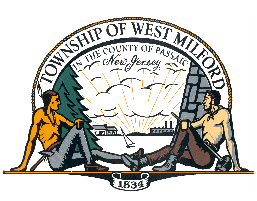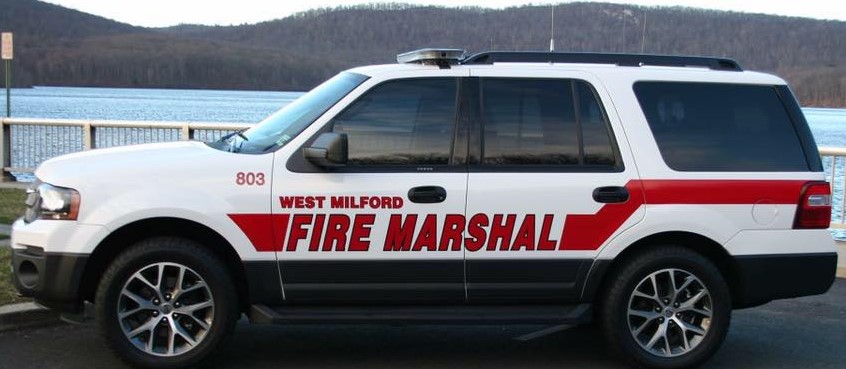Fire Prevention

- Fire Prevention
- Barbecue Safety
- Carbon Monoxide (CO) Detectors
- Certificate of Smoke & Carbon Monoxide Alarms
- Fire PreventionContact Information
- Facebook Page - Fire Prevention Bureau
- Fire Companies
- Fire Extinguishers
- Fire Investigation
- Fire Prevention's Citizen Services
- Fireworks
- Fire PreventionForms & Documents
- Free Smoke Detector Program
- Fire PreventionFrequently Asked Questions
- Historical Fires
- Fire PreventionLinks
- Fire PreventionNews
- SDL Portal
- Smoke Detector Location
- What is 911?
|
|
Office Location:
13 Edgar Drive
West Milford, NJ 07480
Mailing Address:
1480 Union Valley Road
West Milford, NJ 07480
Main Office: 973-728-2840
Fax: 973-728-2880
Mission
The mission of the Office of the Fire Marshal is to reduce fire occurrence and loss of life throughout our community, through regular inspection, maintenance, education and awareness programs.
The Bureau of Fire Prevention is managed by Fire Marshal. The Fire Marshal and Fire Inspectors are responsible for the enforcement of the New Jersey State Uniform Fire Code, National Fire Protection Association Standards, and Local Ordinances. Through regular annual inspections of all businesses and multi family dwellings in the Township of West Milford, continued Fire Prevention and Awareness Programs, the Bureau has significantly reduced fire damage and loss of life throughout the Township since it's inception in the early '70's. Originally a division of the Department of Fire, this office was manned by Volunteer Fire Fighters. The Bureau has evolved into a paid division under the Department of Public Safety and is now the Local Enforcing Agency for the State under the New Jersey State Fire Safety Act.
The Fire Marshal is also responsible for the investigation of all fires and explosions within the Township.
FIRE INSPECTIONS
What to Expect During a Fire Inspection
The inspector will introduce him or herself, present identification and inform you of the purpose of the inspection, i.e. annual fire inspection.
The inspector will ask you for any required paperwork such as a sprinkler and/or fire alarm inspection report.
The inspector will then proceed to inspect the entire occupancy. A representative of the occupant is requested to accompany the inspector. The representative should have keys or other methods to access all areas to facilitate the inspection. During the inspection, the inspector will point out violations and corrective requirements.
The most common violations found are:
- Exit and emergency lighting out
- Exits and exitways blocked, locked, inaccessible Fire extinguisher annual inspection due
- Poor housekeeping, excess rubbish
- Merchandise stacked too high, unstable piles Improper use of extension cords
- Fire doors chocked open
- Improper storage of propane
- Utility access blocked (gas meters, electrical panels) Range hoods and ducts not cleaned
After the inspection is complete you will receive a written report of all violations found and an "Order to Correct" notice. Normally you will have 30 days to correct all violations. In the case of certain serious violations you may be given a shorter time period, typically 7 days to correct the serious violation. If the violation is deemed to be an "Imminent Hazard" , the premises may be closed down until the hazard is corrected. The Bureau will re-inspect on or about 30 days after issuance of the violation notice. It is expected that all violations will have been corrected at that time. Failure to correct all violations may result in the issuance of a penalty. If all violations have been corrected, a "Certificate of Satisfactory Compliance" will be sent to you.
The History of the New Jersey Uniform Fire Code
New Jersey, along with the rest of the nation, experienced an exceptionally large number of fires and fire deaths during the 1960's, 1970's and into the 1980's. In addition to significant fires and fire deaths in New Jersey's larger cities, two major fires with multiple fire deaths occurred in municipalities within Monmouth County. The Brinley Inn fire in Bradley Beach in 1980 resulted in the deaths of 24 people and the Beachview Rest Home fire in Keansburg in 1981 resulted in the deaths of 31 people. These tragedies were a major impetus, which led to enactment of the Uniform Fire Safety Act on November 12, 1983. State Senator John P. Caufield, who was also Director of the Newark Fire Department at the time, was one of the primary proponents of this legislation.
The purpose of the Uniform Fire Safety Act was the Creation of a Fire Safety Commission whose responsibility was to ensure that all areas of the state are protected by a uniform, minimum fire safety code so that the lives and property of the State's citizens are guarded against the hazards presented by fire. Pursuant to enactment of the Uniform Fire Safety Act and the efforts of the Fire Safety Commission, the New Jersey Uniform Fire Code was adopted on February 19, 1985. The State of New Jersey Department of Community Affairs, Division of Fire Safety oversees its application.
The NJUFC, in addition to regulating fire safety inspections, throughout the State, also governs mandatory requirements for firefighter training, firefighter instruction, firefighter equipment, fire investigations, the management of fire and related emergency incident, etc. With regard to fire safety, the NJUFC is essentially divided into two separate areas. The Fire Prevention Code, which was enacted as part of the NJUFC on February 19, 1985 and the Fire Safety Code, which was enacted as an addition, to the NJUFC on June 19, 1986. The Fire Prevention Code regulated the proper maintenance of existing fire protection features of an occupancy; whereas, the Fire Safety Code addresses retrofit requirements in which modifications must be made to address the lack of fire safety in an occupancy. The most recent example of a retrofit requirement is Governor Whitman's signing into law on July 5, 2000 the "Sprinkler Bill" which requires all public and private colleges and boarding schools to install sprinklers. This law was enacted in response to the unfortunate and tragic deaths of Seton Hall University students as a result of a fire in their dormitory on January 19, 2000. Some other aspects of the NJUFC are as follows:
Windowless Basements - requires firefighter access openings, of specific dimensions, to provide entry into a below grade area; if an access opening is not of the required dimension, a fire detection system or fire suppression system is required. This section of the NJUFC was enacted due to the death of a New Jersey firefighter in a basement lacking an appropriate access opening as well as a fire detection system or a fire suppression system.
Truss Placards - requires structures of truss construction to be identified as such by having an emblem of a bright, reflective color and in the shape of a triangle affixed to them. This section of the NJUFC was enacted to alert firefighters to the truss construction of structures after the deaths of five New Jersey firefighters in the collapse of a truss constructed structure involved in fire.
Amusement Buildings - all structures that are designed todisorient, reduce vision, present barriers or impede the flow of traffic (such as haunted houses or houses of terror) are to be equipped with fire detection and suppression systems as well as various other fire safety provisions. Once again, this section of the NJUFC was enacted after the tragic deaths of several teenagers in a haunted house in a New Jersey amusement park.
Egress Issues - example are doors swinging in the direction of egress when occupant load are over 50 people, panic hardware being required on egress doors when occupant load exceed 100 people.
Fire Safety Permits (FSP's) - a FSP is required in order to maintain, store or handle materials, or to conduct processes which produce conditions hazardous to life or property, or to install equipment used in connection with such activities.Some examples for which a FSP is required include the use of a torch, welding or cutting operations, discharging of fireworks, fumigation, bonfires, etc.
General Fire Safety - pertains to a multitude of issues, which are specifically addressed within the NJUFC. This includes maintenance of fire detection and suppression systems, fire extinguishers, means of egresses, storage and housekeeping, electrical safety, heating appliance safety and cooking appliance safety.
The NJUFC is extremely detailed and as a result, it requires competent fire inspectors to interpret and apply. Prior to becoming a certified fire inspector, an individual must complete appropriate coursework and obtain a passing grade on an exam. In addition, once certified, the fire inspector must complete required continuing education training on an annual basis. Furthermore, if a fire inspector knowingly fails to perform his/her duties as imposed by the NJUFC, he or she can be held criminally liable..
Prior to the enactment of the Uniform Fire Safety Act, it was up to each municipality to create and enforce their own local fire code. There were many inconsistencies between municipalities and numerous safety related issues were not addressed. An advantage of having one Uniform Fire Code throughout the State of New Jersey is that it helps to consistently provide a minimum level of fire safety to all people of New Jersey regardless of where they are located.






 Online Tax Payments
Online Tax Payments
 Community Services & Recreation
Community Services & Recreation
 Public Safety
Public Safety
 Emergency Information
Emergency Information
 Meetings & Minutes
Meetings & Minutes
 Forms & Documents
Forms & Documents
 Service Request
Service Request
 FAQs
FAQs
 Links
Links
 Contact Us
Contact Us





